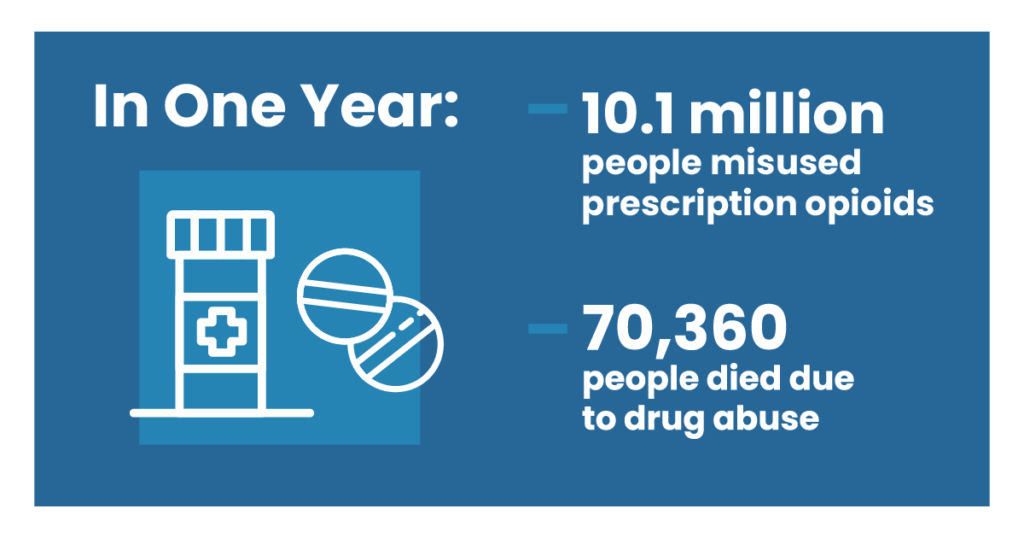
Addiction science can be challenging to understand. Some people believe that addiction results from a lack of self-control or values. However, addiction is a chronic, multifaceted brain condition that can affect people from all walks of life.
Drug and alcohol abuse can have terrible repercussions on the body and psyche and even be fatal. When people start taking drugs for enjoyment or even as prescription medications, tolerance, increased use, and physical dependency can all develop without the user knowing.
Do not put off seeking help for yourself or a loved one until it is too late. According to the U.S Department of Health, 10.1 million people misused prescription opioids, while 70,360 died due to drug abuse.
Substance Abuse Warning Signs
Due to the associated stigma and guilt, it can often be difficult to detect if someone has a substance abuse disorder.
Most people attempt to hide their drug use from friends and family for fear of being judged. However, there are a few things to pay attention to if you suspect someone is struggling with an addiction.
If you believe that you or someone you know has a substance use disorder, look out for the following signs:
- Intense drug desires every day or multiple times a day
- Keep narcotics on hand at all times.
- Purchasing medication even when not needed
- To achieve the same result with a higher dose of a medicine.
- A person may engage in deviant behavior such as stealing or lying to obtain drugs.
- The use of medications to induce risky or harmful behavior, such as driving
- crashes, can happen.
- Drug use occurs despite the implications to one’s relationships, work, and other duties.
- Taking more medications for a more extended amount of time than prescribed
- The great majority of your awake hours are spent consuming or recovering from drug use
- Trying to quit can make you feel ill
Since everyone’s reaction to drugs can be different, not everyone who uses drugs becomes addicted. When people start using drugs more regularly, they lose the capacity to manage when and how much they use.
This is precisely how substance use disorder, often known as drug addiction, develops. These changes can occur over a long period of time and produce issues such as absenteeism from work, problems with the law, health issues, and family strife.
Physical & Emotional Impacts of Drug Abuse
When a person’s health begins to deteriorate, addiction may be identified as a contributing factor. Addiction is linked to a variety of health problems, including:
- Eyes that are swollen, red, or bloodshot
- a sickness that reappears regularly
- Accidents that appear to have no rhyme or reason
- Sudden weight loss or gain
- Unappealing or unsanitary skin, hair, teeth, and nails
- Dehydration symptoms include vomiting and excessive perspiration (physical symptoms associated with withdrawal)
- Slurred words and rambling or fast-paced speech are two examples of changes in speech.
Substance abuse is also associated with alterations in mental health. Keep an eye out for any of the following indicators of a mental health change:
- Unexpected mood swings
- Aggressive and violent behavior
- A resentful attitude
- Nervousness
- Problems recalling previously learned material or memory lapses
- A lack of motivation or concern characterizes apathy.
- Suicidal thoughts or self-injury
Signs of Drug Addiction
If a loved one is not open with you about their dependency on a drug, it can be challenging to distinguish proper drug use from drug abuse.
Below are a few common signs that an individual is abusing drugs and developing an addiction:
- Self-administration or self-medication
- Taking more than the suggested dosage
- Without a prescription, crushing, snorting, or injecting the medicine.
- Using the substance solely for the goal of getting high
The substance itself determines the likelihood and speed with which the addiction develops. Opioid analgesics, such as morphine, can swiftly lead to addiction.
When drugs are taken, enormous amounts of dopamine, a neurotransmitter that promotes euphoria, are produced in the brain.
A sudden halt sends these levels crashing, negatively impacting your mental health in the long term. Increased dopamine levels in the brain cause a high tolerance for a specific substance, which requires the dosage to be increased in order to continue feeling the same euphoric effects.
Drug Addiction Impairs Logical Reasoning
Some people believe they require the drug to feel “normal.” Long-term drug use can impact judgment, decision-making, memory, and learning.
Recovery from drug dependence is a long-term process that can be aided through therapy. It establishes a solid foundation of physical and mental strength and a network of support from which to seek assistance.
Frequently Asked Questions
What are the four common symptoms of addiction?
Each individual has a different definition of addiction. Still, specific symptoms must be paid attention to, such as mood changes, behavioral odds, and energy levels, including a physical shift in weight.
What are the early signs of drug addiction?
Early signs of addiction include intense cravings for the drug and the need to use the substance to function.
What are the psychological signs of drug abuse?
Changes in appetite and sleeping routine indicate that something has been wrong with you, such as bloodshot eyes and sudden changes in behavior, meaning there has been drug abuse. Moreover, impaired coordination is also a psychological sign.
The Haven Detox Can Help
At The Haven treatment facility, we have years of experience treating those sufferings from a drug or alcohol addiction. Our effective inpatient and outpatient treatment programs with detoxification, various behavioral therapies, support groups, and medication-assisted treatment are exactly what you need for a successful long-term recovery.
If you or a loved one have shown signs of addiction, The Haven is here to help. When you are ready, give us a call for more information about our treatment services for alcohol and drug problems.